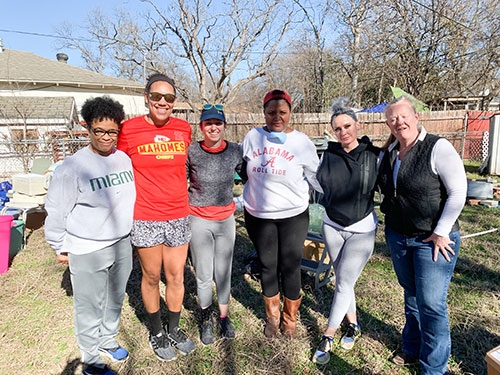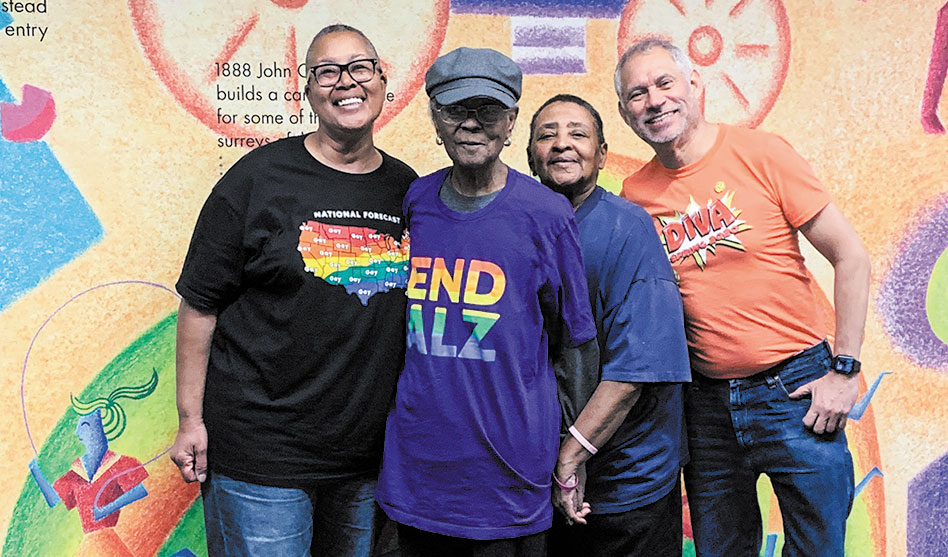Portia Cantrell, left
Portia Cantrell is working to keep seniors together while keeping them apart
DAVID TAFFET | Senior Staff Writer
taffet@dallasvoice.com
Portia Cantrell, who created the senior social group Silver Pride, has had to rethink how to keep her group together while at the same time keeping them safely socially distanced.
Cantrell reacted to warnings about the coronavirus earlier than most people. Her wife, T’Anya Carter, is a nurse, and the couple has friends who are medical professionals in New York and Seattle. So Cantrell took those early warnings seriously and shut down Silver Pride’s daily gatherings in libraries and recreation centers before the county and the city issued orders to suspend such gatherings and close non-essential businesses.
Seniors, Cantrell understood from the beginning, would be more severely affected by the virus than the population in general.
Silver Pride was created two years ago to decrease social isolation that occurs among older people, especially among older LGBTQ community members who don’t have close family. Cantrell began organizing meetups at Oak Lawn and Grauwyler libraries, bringing in speakers to discuss health issues, diet and cooking, scams targeting the elderly and more.
Reverchon Recreation Center partnered with Silver Pride to provide a place for seniors to get some exercise. Cantrell would arrange for breakfast or lunch to be served, and she created game nights and movie nights at Grauwyler after the library was closed.
Cantrell also created a prom for seniors. The last few years it’s been held at the Erik Jonnson Library across from Dallas City Hall.
“That was something people looked forward to,” she said. “We all like getting dressed up and getting our hair done, but not everyone can afford more expensive events.”
More than anything, Silver Pride was a place for seniors to get together and just chat.
Then came coronavirus.
“T’Anya warned this is serious; this thing is spreading.” Cantrell said, adding that they were looking at what was going on in other countries. And they knew, “This thing is coming here.”
Cantrell said Carter told her, “You’re not going to be able to live with yourself if someone you know was infected or was infecting someone else” through Silver Pride activities.
So all Silver Pride meetings were cancelled. This year’s prom came off the calendar. No meet-ups.
But that left the group without social contact. Before any official stay-at-home orders came through, Cantrell knew Silver Pride members would need to stay home for several weeks. But she also knew members of her group needed food and other necessities.
So Cantrell started delivering and keeping in touch with her group by phone to make sure they continued to socialize.
But Cantrell couldn’t do it all herself, so she enlisted some younger volunteers who had worked with the group before. She talked about one project Silver Pride did with a couple of dozen younger helpers in which a couple who had been together for more than 40 years needed some help at home. One of the women had Alzheimers and needed hospice care.
But before that could happen, the house needed some work.
So the volunteers brought in a dumpster to clean out the house, then they steamed the carpets. They painted and did other work before healthcare professionals came to assist.
Cantrell said as she was thinking about what Silver Pride members could do to help each other, and she realized: They would simply help each other.
So she found volunteers and matched each one with a senior who needs some assistance with shopping.
The woman Cantrell helps is 91, so “We’re being super careful,” she said.
 The woman sends Cantrell a list of what she needs. Cantrell shops for and delivers the items. At first Cantrell would take the groceries into the house. But now, to protect herself and the woman, there’s no in-person contact; Cantrell hangs the grocery bags on her door before calling the woman to let her know her groceries are there.
The woman sends Cantrell a list of what she needs. Cantrell shops for and delivers the items. At first Cantrell would take the groceries into the house. But now, to protect herself and the woman, there’s no in-person contact; Cantrell hangs the grocery bags on her door before calling the woman to let her know her groceries are there.
Other volunteers are also careful. Rather than exchange cash, they leave the receipt in the grocery bag, and the person they shop for repays them using Venmo or Cash App. Cantrell said she is glad one of the classes Silver Pride held earlier was on using phone apps.
Cantrell acknowledges the technology can be challenging for seniors, so rather than hold Zoom meetings, they’re meeting by phone. “It means so much to know people around you care,” she said. “Knowing everyone cares makes you healthier.”
Cantrell looks forward to people being able to meet again, although she’s not sure exactly what that will look like, since seniors will still be more vulnerable to infection than the population in general.
Before the COVID-19 outbreak, several librarians from around the city were in touch with Cantrell telling her they regularly get older LGBT people coming into their libraries to check out books. They were interested in starting groups around the city where older LGBT could engage. Maybe after the current crisis is over, Cantrell said, smaller groups will gather in more places around the city.
But while those plans are on hold, along with any sort of meetup, Cantrell said, caring for each other continues through the pandemic.














Thank you so much for the article hilighting the unique needs of the elders of our community. There are so many people that make SPP work, like Marion Hayes and David Bellomy, as well as all of the young members of our community that show us they are indeed the children that so many of us never had! Thank you so very much, David Taffet!!!!